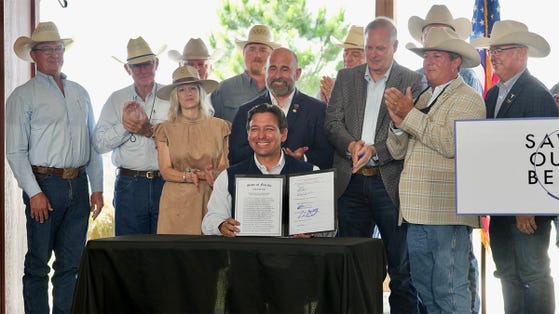Upside Foods challenges Florida’s ban on lab-cultivated beef, poultryUpside Foods challenges Florida’s ban on lab-cultivated beef, poultry
The prohibition, which Florida says protects local agriculture, is both unconstitutional and a violation of federal law, the lawsuit claims. Find out more about the dispute.

At a Glance
- Upside Foods touts cultivated meat's benefits such as reduced environmental impact and lower disease risks.
- Gov. Ron DeSantis said his office would invest in farmers and ranchers, adding, “We will save our beef.”
- Gov. Ron DeSantis said his office would invest in farmers and ranchers, adding, “We will save our beef.”
What seems to be the first lawsuit challenging Florida’s ban on lab-cultivated meat has been filed in Tallahassee.
Upside Foods of Berkeley, California, claims the law is unconstitutional because it violates the Supremacy Clause, which gives the federal government the power to regulate meat and poultry products, according to the lawsuit.
The nonprofit law firm Institute for Justice, which Politico describes as libertarian-leaning, will request a preliminary injunction—a request to put the law on hold, essentially—soon. Upside Foods wants to provide samples of its cultivated products at a Miami Beach art festival this year, Politico reported.

Florida Gov. Ron DeSantis signed the cultivated meat ban into law on May 1.
“Today, Florida is fighting back against the global elite’s plan to force the world to eat meat grown in a petri dish or bugs to achieve their authoritarian goals,” DeSantis said, according to a press release from his office. “Our administration will continue to focus on investing in our local farmers and ranchers, and we will save our beef.”
In announcing the lawsuit, the Institute for Justice rejected the legitimacy of this claim.
“Protecting in-state agricultural interests from innovative out-of-state competition is not a legitimate use of government power. Indeed, a major reason for adopting the U.S. Constitution was to ensure a national common market,” the law firm’s press release stated.
Wilton Simpson, the state’s commissioner of agriculture, supported the law. In the press release, Simpson said, “Lab-grown meat is a disgraceful attempt to undermine our proud traditions and prosperity, and is in direct opposition to authentic agriculture.”
The lawsuit, filed on Aug. 12, lays out several benefits of cultivated meat:
It doesn’t require the large-scale slaughter of animals.
It limits the environmental costs of raising and slaughtering livestock, such as producing and transporting animal feed, raising the animals, transporting animals to processing plants and more.
It limits the creation of greenhouse gases by animals and eliminates waste-related pollution.
It reduces the risks related to zoonotic diseases and antibiotic-resistant infections.

Cultivated chicken made by Upside Foods on a bed of lettuce on a plate. Credit: Upside Foods
Federal government approved cultivated meat
The U.S. Department of Agriculture approved cell-cultivated meats in June 2023, giving Upside Foods and Eat Just the opportunity to sell their products directly to consumers. Both brands introduced cultivated chicken through notable restaurants.
Eat Just has been selling its cultivated meat in Singapore since 2020. The Food and Drug Administration approved the brand’s chicken in March 2023.
Although the lawsuit only challenges Florida’s law, Alabama Gov. Kay Ivey signed a similar law in May. Other states have introduced bans, as well. The Arizona Senate did not pass a similar bill on June 12.
Cardiologist Dr. Uma Valeti founded Upside Foods. A cardiologist, Veleti was managing the student kitchen at his medical school. A trip to a slaughterhouse prompted him to find more human methods of putting meat on Americans’ plates. Valeti also serves as the company’s CEO.
The lawsuit does not name DeSantis, but other Florida government officials are listed as defendants: Simpson, Ashley Moody, the Florida attorney general; and state attorneys of four judicial circuits.
Read more about:
InnovationAbout the Author
You May Also Like





